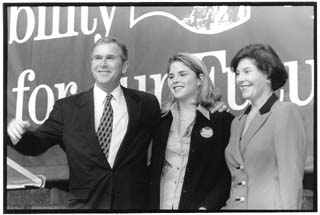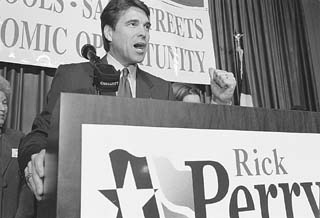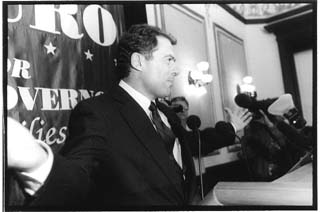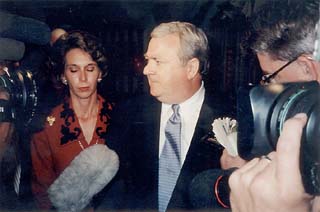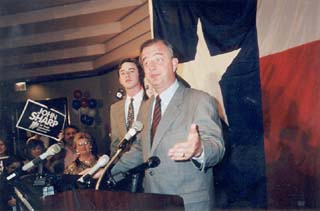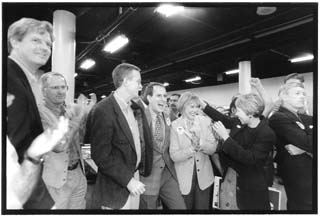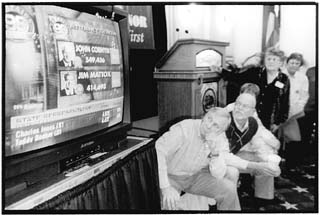https://www.austinchronicle.com/news/1998-11-06/520568/
Bittersweet Ending
Notes From the Republican Revolution
November 6, 1998, News
|
|
Here at the Convention Center on Election Night it is like another planet, or the scene of some weird post-Apocalyptic nightmare, reminiscent of the episode of the Twilight Zone where Burgess Meredith is the last man on Earth. Only in this version, you are the last progressive Democrat. Everyone is a rabid Republican. Everyone is white and well-dressed and very, very stiff. Everyone is trying to have fun, but not quite knowing how. Joy and smugness are hard to differentiate. "There's no tension," more than one supporter explains to you later. "We knew this would happen. You guys in the media were pretending it wouldn't, but it did."
Every campaign has its own room, but every room from the Neches Suite to the Waller Creek Terrace has the same tired melon balls and cheese cubes, the same overpriced cash bar with $4 dixie cups of wine, the same chatty folks dressed in gray flannel and navy suits, speckled with campaign stickers. But everyone moves from room to room anyway, looking for VIPs -- or perhaps vainly hoping for better food. In Ballroom B, where the Rick Perry campaign is gathered, a country band, The Kyle Sisters, entertains the crowd. After their set, one of the sisters, Mary Margaret Kyle, recounts the day's testimony from the Roger Scaggs murder trial (her husband is an investigator for Roy Minton's defense team) and checks on the status of the District 46 race where her nephew Rick Green (He of the "Vote for my Daddy" commercials) is running. He lost by 20 votes.
8:30: The word "history" is tossed around like a rubber ball. In the main ballroom, dubbed the "Bush Room" this evening, a few eager supporters in sequined, Texas flag-patterned vests have already staked out their spots near the victory stage, beneath the "BUSH: Responsibility -- Opportunity for Our Future" sign. The governor won't be there for another two hours, but no wait is too long when there are television cameras involved. The Bush Room has three underpopulated bars, two movie screen-sized monitors broadcasting returns, and one Dale Muenzer walking around wearing a T-shirt proclaiming "I Am Part of the Vast Right Wing Conspiracy" under his navy blazer. Bored teenagers meander the hallway trying to plaster "Greg Abbott for Supreme Court" stickers on everyone. "Bush 2000" presidential campaign buttons are starting to circulate.
9pm: John Cornyn's shock of white hair bobs above the Ballroom C crowd as he makes his way to the stage, kissing supporters and shaking hands. "Is our race over?" several confused party-goers ask. After all, this was the race that was supposed to give the GOP trouble, wasn't it? When Cornyn takes the stage a half-hour later to declare victory, the party cranks up a notch. It is the first sign that Bush's coattails are definitely longer and stronger than the polls had predicted.
9:10: Back in the Bush Room, David Dewhurst takes the victory stage. "Friends, voters of Texas have spoken and said, after 16 years of a liberal administration in the land office, that they want a change," he informs the still-sparse crowd. He ends the muddiest race of this season by telling his mother: "Momma, we ran a clean campaign." Dewhurst becomes the first Republican land commissioner in 120 years. The question still remains: "David, what does the land office do?"
9:35: With Cornyn, Susan Combs, and Dewhurst already declaring victory, Rick Perry decides he wants in too. State Sen. Teel Bivins (R-Amarillo) takes the stage in Ballroom B and shouts, "We Won!" -- about three hours too early. Perry takes the mike and backtracks a bit: Someone must've told him only 23% of the precincts were in. "This is close," says Perry. "We're ahead. This is a very historic victory we are on the cusp of." Hearty cheers ring out when he announces that Jim Mattox has given his concession speech at Scholz's. "We're pretty sure George is going to squeak by," Perry jokes. "We'll be back in a few minutes to deliver our victory speech." At 11:45 we're still waiting ...
10:03: Bush takes the stage with First Lady Laura Bush and one of their twins. "I am humbled and honored by your overwhelming vote of confidence," he tells the Convention Center crowd. Then he has a few words for "Mi amigos Hispaños." Truth be told, the only Hispanics at the Convention Center were the security guards and concession workers, who by 10:30 were itching to go home. So much for inclusion.
Actually, it was Jeb Bush who got the most enthusiastic round of applause of any GOP candidate. The crowd erupted when the governor said: "I'd like to say something to the governor of Florida: Good going, brother." Bush said his vote was a mandate for tax cuts -- "that government shouldn't be all things to all people." He said it was a mandate for his brand of "compassionate conservatism." Compassionate conservatism -- hmmm, kind of has a "1,000 Points of Lights" ring to it. One woman energetically offers, "He's definitely a national-type caliber person, doncha' think, honey?" An avalanche of balloons cascades from the ceiling, and "God Bless Texas" shakes the room. A few people sway to the music and sing along, but most make a beeline for the door.
10:35: Small solace is found watching New York Sen. Al D'Amato's concession speech. The Republicans around the television groan, "What a shame," as they say goodbye to Senator Pothole. They tsk tsk the report that California Democrat Gray Davis has won the governor's race. And shake their heads when North Carolina's Lauch Faircloth bites the dust.
11pm: It's like Casablanca in the Waller Creek Terrace as everyone waits and waits and waits for word on Carole Keeton Rylander and the comptroller's race. Paul Hobby is hanging on. There's no sign of Rylander. "Maybe she's already decided she doesn't want the job," a television cameraman jokes. Rylander's "One Tough Grandma" commercial runs over and over again like Chinese water torture. A bunch of suits are swarmed over a computer in the corner,fixated on the Secretary of State election results site. It's still way too close to call. It will be two hours before Rylander can declare victory.
|
|
11:50: 100,00 votes ahead with 75% of precincts reporting, Perry can finally retake the stage in Ballroom B. "Thank you for staying tonight," he shouts to the crowd. "I think you got what you wanted, what we all wanted to do was to be here in Austin on this absolutely historic night."
Midnight: The Convention Center floor is a mosaic of deflated red, white, and blue balloons and popcorn kernels. Discarded plastic beer cups roll through the hallway. Two men are shouting at the television broadcasting Channel 6's live Palmer Auditorium feed, like it's a basketball game. Angered by the easy passage of the 12 bond propositions, one says, "Voters are so stupid."
Back at CNN Center, Bernard Shaw and Jeff Greenfield try to convince us that it's not as bad as all the pundits thought it would be. Nationally it isn't. There are some interesting surprises: Among them, WWF hero Jesse "The Body" Ventura wins the Minnesota governor's race as a third-party candidate. (His speech has a pro-wrestler's poetry to it: "They said a vote for us was a wasted vote, but we wasted them with our votes.") For the first time since 1822, the party in the White House has picked up seats in the middle of a president's second term. Even the Drudge Report says Congress can stick a fork in the Clinton impeachment process.
But at the Convention Center, the Democrats' worse-case scenario has come true: The Republican sweep. Nationally, newspapers may be trumpeting "Democrats Dash GOP Hopes," but in Texas, it was the Bush-driven Republican Mack truck that did the hope-dashing. -- Lisa Tozzi
Mauro and Friends
It's times like these when you find out who your friends really are, and Garry Mauro has more than a few. By 9:30pm on election night, the Republican sweep was well underway: George Bush, David Dewhurst, Tony Garza, and Susan Combs had already declared victory over Mauro, Richard Raymond, Joe Henderson and Pete Patterson, respectively, and the Democrats' best contenders -- John Sharp, Jim Mattox, and Paul Hobby, were already on the ropes.
|
|
But several hundred supporters assembled in the Driskill Hotel Ballroom, the same room where Mauro's vanquisher, George W. Bush, had announced his re-election campaign. The Mauro crowd, though much more subdued than Bush's had been, was growing slowly; nametags indicated the arrival of refugees from other losing Democratic campaigns. Then Mauro appeared -- the party's ticket leader and worst defeat of the election by far. He spent a while working the room before climbing to the podium, liberally dispensing hugs to downtrodden supporters, several of whom were weeping freely.
The people in the room were those traditionally associated with extreme Democratic loyalists: women, African-Americans, Hispanics, and senior citizens, with a fair sprinkling of well-dressed, twentysomething political types. The crowd, thick with reporters, pushed toward the stage to hear Mauro's concession speech, which he said was a celebration of our ideas: higher teacher pay, smaller classroom size, college scholarships, and a patients' bill of rights, to name a few. The audience was into it, calling out responses on the order of "I'll vote for you again!" and "We're proud of you, Garry."
After Mauro finished speaking, though, there wasn't much worth hanging around for. There was no food to speak of, and the services of the modest cash bar could be duplicated -- with fewer reminders of the evening's political carnage -- at any bar in town. So the true believers, who stayed faithful to the end of one of the least-likely-to-succeed campaigns in Texas history, finally left. -- Jenny Staff
Mattox Takes a Hit
The Democratic Party in Texas died at 9:55pm on Nov. 3. That was when Jim Mattox told his supporters, "Tell everybody to move to the front." Dozens of grim-faced supporters at Scholz Garten did as instructed. The TV was offering no solace -- 30 minutes earlier, Mattox's boosters had watched as Garry Mauro conceded the gubernatorial race. With a quarter of the vote tallied, Mauro was trailing Bush 68% to 31%. When Mauro's supporters cheered for him, Mauro wryly asked, "What would y'all have done if I'd have gotten 40%?" The Mattox supporters didn't laugh. Instead they watched as the disappointing numbers continued to roll in. John Cornyn was beating Mattox, beating him badly. Polls had shown Mattox up by 10 points or more. The actual votes showed Cornyn beating Mattox by that amount. TV stations were declaring Cornyn the winner. Mattox, the man who was expected to be the Texas Democratic Party's version of Lazarus and lead them back from the dead, was instead being trounced.
|
|
By 9:45, Mattox had been accepting condolences for nearly an hour. Travis County District Court Judge Scott McCown told Mattox, "You ran a hell of a race. The real tragedy is that you won't be there to do all the good things you would've done." Mattox, at times appearing to be near tears, knew the time had come. He hugged his son, Jimmer, as photographers scrambled to get a picture. Then, the former attorney general climbed onto the stage and told his supporters, "My opponent has managed to prevail. I don't know exactly what to say. I didn't prepare a concession speech. What this race has proven is that if you have enough money, you can run a vicious, negative campaign, and be a Republican and win." Then, almost as an afterthought, Mattox told the crowd of 150 or so supporters, "We Democrats have a heck of a lot of work to do." -- Robert Bryce
Sharp Pains
At 10 minutes until midnight, Rick Perry declared victory. The room at the Omni, where John Sharp's supporters were nervously watching the results, got quiet. The chatter stopped. The sound controls on the TV sets were turned down. Photographers near the stage checked and re-checked their equipment. Surely, Sharp would be out soon to concede. Five minutes passed, then 15, then 20.
Perry had been stubbornly clinging to a two- point advantage throughout the night. Whispers had gone through the crowd that boxes from South Texas and El Paso had not yet been counted. There was still hope. Power brokers came and went. State Sens. Gonzalo Barrientos and Elliott Shapleigh of El Paso talked quietly just outside the ballroom. Lobbyists like Lena Guerrero and Democratic mainstays like Cecile Richards were also milling around, waiting, wondering when Sharp would admit defeat. By the time he finally appeared at 12:35, many of his supporters had gone home. Mounting the stage with his wife Charlotte and son Spencer by his side, Sharp told the crowd in a hoarse voice, "Apparently, we will not get enough votes."
|
|
Then, in an explanation of his tardiness, he said, "I would have come down earlier, but I didn't know what to say." Sharp said there were about 500,000 votes that were yet to be counted and he didn't want to concede too soon. But for some of the attendees, the concession speech was met with pure dread.
Perhaps the saddest face in the Sharp crowd was worn by Bob Stallman, the president of the Texas Farm Bureau, which had endorsed Sharp even though Perry, as the sitting agriculture commissioner, was the group's most logical choice. Stallman stayed until the bitter end, knowing that he and the Farm Bureau had backed the wrong horse. After Sharp's speech, Stallman was asked if his group would be hurt by the endorsement. "The Farm Bureau has a 65-year history of working with statewide officeholders. We will certainly work with Rick to the extent he will allow us. -- Robert Bryce
Finger Pointing
Election '98 will be remembered in Travis County as the year voter returns dribbled in until the wee, wee hours. And the day after that will be remembered as the day everyone was pointing fingers, trying to lay blame for the delay in tallying the votes, which officially ended at 3am.
That's probably no surprise to TV viewers who saw most other statewide returns reported between 9:30 and 10pm, while Travis County results still reflected little beyond early voting returns.
"The rumor is that [County Clerk] Dana DeBeauvoir is blaming the Commissioners Court for not giving her enough funding," said outgoing County Judge Bill Aleshire. "That's no rumor," countered DeBeauvoir. "I asked the commissioners in June of this year to fund us for additional equipment. They did not." DeBeauvoir went a step further and issued a press release that laid out her defense. She later elaborated that she had asked commissioners for $248,000 to purchase automated ballot counters, which she said are used in several other Texas jurisdictions. "It's not a matter of inefficency," DeBeauvoir explained of Tuesday night's delay. She said the county's existing optical-scan system is outdated when compared to the technologically advanced systems used in other counties willing to spend millions on vote-tallying equipment.
A quick check of a couple of Commissioners Court offices on Wednesday found aides trying to remember whether DeBeauvoir did, in fact, request funding for upgraded equipment. One office seemed to remember a request for a computer upgrade a while back, but no one could immediately recall anything more specific.
"I think we need to suggest that Dana conduct a study, comparing Travis County's system to other counties," Aleshire said. "And I hope Dana won't be personally offended by that."
"I already did that!" DeBeauvoir responded. She said the findings were published in a report in 1994. So goes just another all-in-a-day's-work spat between the county clerk and county judge. But DeBeauvoir is already taking heart: "We've got a new Commissioners Court coming on," she said. "It has to get better." -- Amy Smith
All Together Now
City bond organizers and supporters knew they had partying rights on their side long before election day returns drifted in. Early voting results gave them a clear-cut edge, and by 10:45 at 700 Brazos -- bond election headquarters -- the food trays offered slim pickings and the once-plentiful beer and wine stock had dwindled to a few drops. Mike Blizzard, who campaigned for the $712 million package, leaned against a wall in the hallway and reiterated his resolution to boycott Palmer on election night. "It's a waste of time," he declared, hoisting a beer to his lips. "And why leave a good party just to go there and stand around?"
|
|
Even campaign consultant Mark Yznaga was uncharacteristically animated long before the final vote tally. "People feel good about their lives right now in the city," he said, explaining the bonds' across-the-board inclusiveness. "There was a real community involvement in the bonds -- we had the Junior League, the Asian Community, the Hispanics, the Chamber, environmentalists, all working together. That speaks volumes. We thought the opposition was not organized well ... What kind of person is against libraries and parks?" Yznaga was referring to, among a handful of others, Texas Monthly publisher Mike Levy, who reportedly sent a letter to 80,000 voters, urging them to vote against Prop. 2 (parks and recreation) as a way of sending a message to council that citizens would prefer upgrades on the public safety front.
Tuesday night, Mayor Kirk Watson shrugged off Levy's last-minute attempt to derail the bond package. "It's very exciting that voters want to make an investment in their community," he said outside Palmer. "One of the things that's occurring in Austin is a spirit of cooperation and a sense that we live in a very special place. People here realize that we live in a very special place."
Asked what he thought about the rest of Texas handing Republicans control over the state, the former county Democratic chair didn't hedge: "We live in a very special place." -- Amy Smith
What's the Score?
With a lockout delaying NBA opening day, and with so many sports celebs making the foray into politics, it shouldn't be too surprising that the late edition of ESPN's SportsCenter provided some of the evening's most interesting -- if not the most comprehensive -- election coverage. The network began and ended every commercial break with a scoreboard posting election results in all sports-related races. TV-news style "election music" provided the backdrop. Among the big stories reported: San Diego voters approving $411 million for a new ballpark for the National League Champion Padres; the Cincinnati Reds gaining voter approval to build a ballpark along the Ohio River, and the six-county Denver metro area somewhat shockingly agreeing to build a mostly taxpayer-funded stadium for the Broncos, to replace legendary Mile High.
But the Election Day sports story around here was Round Rock voters' overwhelming passage of Prop. 1. The measure -- which allows the city to use hotel-motel tax to fund $9 million of a planned $13 million minor-league baseball stadium for Nolan and Reid Ryan's Double A team, the Round Rock Express -- garnered over 70% of the vote despite some vocal opposition from a citizens group called Strikeout Corporate Welfare, who oppose using public funds to pay for a private enterprise. The Texas Hotel-Motel Association, objecting to the use of the bed tax to pay for a ballpark, sunk $5,000 into the anti-stadium effort, and reportedly intends to continue to fight the funding plan. -- Lisa Tozzi
TV Snooze
On the media front, the television stations were a great disappointment. No, we didn't expect them to provide insightful coverage -- we expected them to make hilarious, stupid gaffes. But they let us down, with only minor errors here and there. It's interesting to note how TV anchors aren't nearly as polished when they can't read from the teleprompter and have to wing it -- for some reason, more than one anchor pronounced "Bush" as if it rhymed with "mush," and K-EYE's Christie Fletcher referred to lieutenant governor candidate Rick Perry's opponent, "Jim Mattox" (who, of course, was actually running for attorney general.)
|
|
Mattox, for his part, provided one of the more telling moments of the night. During his concession speech, he was obviously about to launch into an attack, starting with "To the members of the media, I want to say this ..." But that was all we got to hear, as KVUE promptly cut back to the studio.
Indeed, the media never really seems to stop and allow any criticism of itself. All the stations could talk about in the gubernatorial race was Bush's landslide victory, rather than the issues on which the candidates ran. They rarely bothered to talk about anything but the polls before the election, so it wouldn't have made sense to talk about issues now, would it?
Kudos to Channel 6, however, for teaming up with KLBJ-AM to provide some commentary to go with the visuals from Palmer Auditorium, and to KLBJ for getting the earliest start on coverage, at 8pm. -- Lee Nichols
Medical Marijuana Pitches a Shutout
Tuesday was a day of triumph and controversy for supporters of medical marijuana, who say that smoking pot may help ease pain and nausea for some patients. Pot-related ballot measures passed in Alaska, Arizona, Nevada, Oregon, and Washington state -- and probably in Colorado and Washington, DC as well, though opponents would rather not allow those results to be tabulated or publicized.
ï Alaska voted to protect users of medical marijuana -- and caregivers who recommend its use -- from most state and local laws that forbid possession. The measure was endorsed by the state AMA chapter and the Alaska Nurses Association, though former first lady Barbara Bush campaigned against it.
ï Arizona voters confirmed their 1996 approval of a plan to legalize medical marijuana and some other illegal drugs for seriously ill patients.
ï Nevada, by a margin of almost 2-1, passed a constitutional amendment approving medical marijuana, but will have to confirm their vote in two years. (Meanwhile, the state attorney general's office said it would not enforce the measure unless federal law is changed.)
ï Washington state, by 59-41%, voted that patients with certain illnesses, or their caregivers, may grow and keep a 60-day supply of marijuana. After a broader proposal failed last year, organizers came back with what they think is going to be "a model for the rest of the country," according to Rob Killian, the Seattle physician who sponsored the measure.
ï In Oregon, medical marijuana appears to have passed with 55% of the vote; also, voters overwhelmingly quashed a proposal to re-criminalize simple possession of the drug.
But the results of two other medical marijuana votes were unknown: In the District of Columbia, election officials chose to keep results secret because Congress, which controls the capital's budget, opposes legalization and cut funding for the initiative after it appeared on the ballot. The American Civil Liberties Union said it would request the tallies using the Freedom of Information Act. And in Colorado, ballots were collected but not counted, pending the outcome of a legal challenge. Exit polls, however, showed the measure passing, 58-42%. -- Nick Barbaro
Interracial Marriage Now Legal in South Carolina, and Other News Flashes
ï South Carolina voted -- by a closer margin than expected -- to remove a ban on interracial marriage from its state constitution. The removal of a clause prohibiting "marriage of a white person with a Negro or mulatto or a person who shall have one-eighth or more of Negro blood," was approved by only 62% of the state's voters. State Democratic Party Chairman Richard Harpootlian said he was surprised at the slim margin, and criticized those who voted against it. "I think they are stupid," he told the AP.
ï Oregon voters approved the dedication of lottery funds to environmental protection, by almost 2-1, but went 81% against increased environmental regulation of the logging industry.
ï In Michigan, voters declined to become the second state to legalize physician-aided suicide.
ï Alaska and Hawaii both voted against same-sex marriages. Hawaiians allowed the legislature to "reserve marriage to opposite-sex couples." Alaskans went further; their constitution will now limit marriage to "exist only between one man and one woman."
ï Washington state voters approved a measure to do away with affirmative action in the state. The margin was a comfortable 59-41%, but interestingly, exit polls showed women split 50-50 on the issue, while men went for it, 65-35%.
ï Washingtonians also voted 2-1 to raise the state's minimum wage by about 35%, and to tie it to the cost of living. And, by a 57-43% margin, they turned down a proposal to ban late-term abortions.
ï Closer to home, voters in Round Rock overwhelmingly approved funding for a minor-league baseball stadium by a 72-28% margin, and Cedar Park voted by 59-41% to end its affiliation with Capital Metro. -- Nick Barbaro
Copyright © 2024 Austin Chronicle Corporation. All rights reserved.

